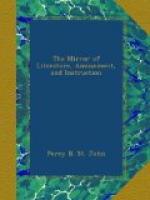Upon the arrival of the funeral train at Caen, it was met by Gislebert, bishop of Evreux, then abbot of St. Stephen’s, at the head of his monks, attended by a numerous throng of clergy and laity; but scarcely had the bier been brought within the gates, when the report was spread that a dreadful fire had broken out in another part of the town, and the duke’s remains were a second time deserted. The monks alone remained; and, fearful and resolute, they bore their founder “with candle, with book, and with knell,” to his last home. Ordericus Vitalis enumerates the principal prelates and barons assembled upon this occasion; but he makes no mention of the Conqueror’s son Henry, who, according to William of Jumieges, was the only one worthy of succeeding such a father. Mass had now been performed, and the body was about to be committed to the ground, “ashes to ashes, dust to dust,” when, previously to this closing part of the ceremony, Gislebert mounted the pulpit, and delivered an ovation in honour of the deceased. He praised his valour, which had so widely extended the limits of the Norman dominion; his ability, which had elevated the nation to the highest pitch of glory; his equity in the administration of justice; his firmness in correcting abuses; and his liberality towards the monks and clergy; then finally addressing the people, he besought them to intercede with the Almighty for the soul of their prince. At this moment, one Asselin, an obscure individual, starting from the crowd, exclaimed with a loud voice, “the ground upon which you are standing was the site of my father’s dwelling. This man, for whom you ask our prayers, took it by force from my parent; by violence he seized, by violence he retained it; and, contrary to all law and justice, he built upon it this church, wherein we are assembled. Publicly, therefore, in the sight of God and man, do I claim my inheritance, and protest against the body of the plunderer being covered with my turf.” The appeal was attended with instant effect: bishops and nobles united in their entreaties with Asselin; they admitted the justice of his claim; they pacified him; they paid him sixty shillings on the spot by way of recompense for the place of sepulture; and, finally, they satisfied him for the rest of the land.
But the remarkable incidents doomed to attend upon this burial were not yet at an end; for at the time when they were laying the corpse in the sarcophagus, and were bending it with some force, which they were compelled to do, in consequence of the coffin having been made too short, the body, which was extremely corpulent, burst, and so intolerable a stench issued from the grave, that all the perfumes which arose from all the censers of the priests and acolytes were of no avail; and the rites were concluded in haste, and the assembly, struck with horror, returned to their homes.




